Edition: 14 to 25 August 2023
RISK REDUCTION
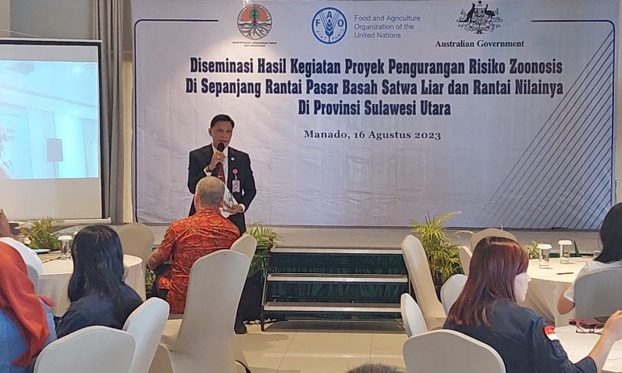 ©fao/Ali Rizqi | INDONESIA Dissemination of Wildlife Wet Market project results in North Sulawesi Province On 16 August 2023, FAO ECTAD Indonesia disseminated the Wildlife Wet Market (WWM) Project achievements to the Indonesian Ministry of Environmental and Forestry (MoEF) and the North Sulawesi Provincial Government in Manado, North Sulawesi. Since early 2022, the WWM Project has been running in North Sulawesi Province with funding from the Australian Department of Foreign Affairs and Trade (DFAT). The representatives from the Ministry of Agriculture, North Sulawesi Natural Resource Conservation Center, Bogani Nani Wartabone National Park, Center for Implementation of Instrument Standards for Environmental and Forestry Manado, North Sulawesi provincial services, universities, National Research and Innovation Agency, and development partners also attended this meeting. On this occasion, FAO presented the results of the risk profiling, value chain, and Knowledge, Attitude, and Practices (KAP) study, which will be utilized to develop a five-year draft roadmap for reducing zoonotic disease risk along the wildlife value chain in North Sulawesi Province. By the end of the meeting, participants produced a follow-up action plan for the creation of this five-year roadmap. |
ANTIMICROBIAL RESISTANCE (AMR)
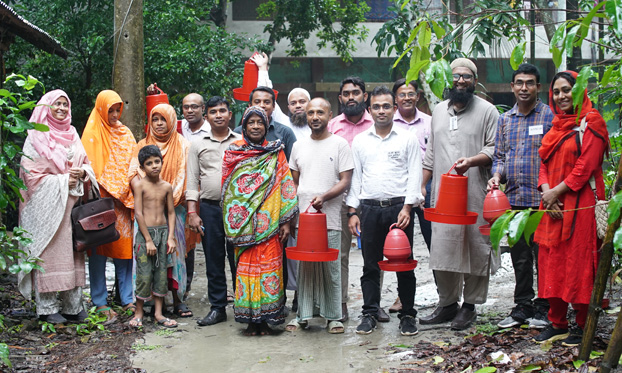 ©FAO/Asif Jilani | BANGLADESH AMR/AMU Introductory training Three Day U2C II/BARA (Upazila to Community / Bangladesh AMR Response Alliance) introductory training for poultry farmers on AMR/AMU was held on 23-25 August 2023 in Khulna, facilitated by FAO and funded by Fleming Fund UK and USAID to support ensuring the responsible use of antimicrobials in poultry farms which has been identified as a core activity of ECTAD Bangladesh. Following the BARA AMR/AMU training modules and U2C II model farmers training module, a small group of experienced U2C and BARA veterinary trainers from both the Department of Livestock Services and the private sector along with FAO technical advisors identified key behaviours of farmers that needed to be addressed and designed the training programme to establish a model farm ensuring responsible AMU. |
-in-probiotics.jpg?sfvrsn=7f40a0ab_1) ©FAO/Rallya Telusa | INDONESIA Strengthening AMR Monitoring in Indonesia through Antimicrobial Susceptibility Test (AST) in Probiotics Generating reliable antimicrobial susceptibility test (AST) data is critical for monitoring antimicrobial resistance (AMR) profiles in probiotics and screening bacteria that may have AMR genes that can be transmitted to animals that consume the probiotics. To ensure the reliability of AST data in Indonesia, FAO ECTAD Indonesia, together with the Indonesian Ministry of Agriculture (MoA) supervised the implementation of the AMR monitoring in probiotics pilot conducted by the National Veterinary Drug Assay Laboratory (Balai Besar Pengujian Mutu dan Sertifikasi Obat/BBPMSOH) from 24 until 25 August 2023. FAO also provided input during the two-day implementation to ensure that the testing and data analysis implemented using the Sensititre systems were performed correctly. Furthermore, BBPMSOH will continue to optimize DNA extraction procedures and conduct whole genome sequencing for DNA of Bacillus spp. and probiotic samples using Nanopore technology provided by FAO. |
SURVEILLANCE
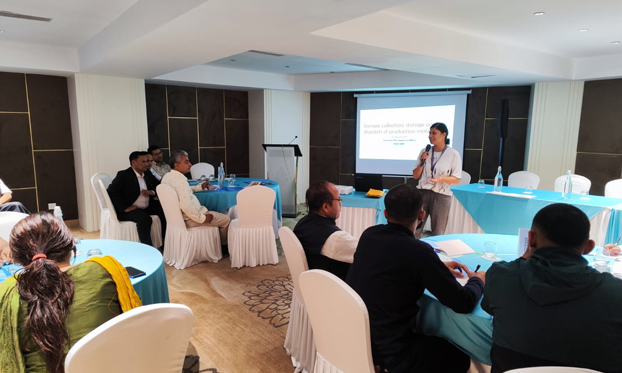 ©FAO/Surendra Karki | NEPAL Animal Quarantine Personnel trained in Disease Recognition and Reporting FAO Nepal, through the USAID funded GHSP project, conducted two slots of 3-day training in Kathmandu for 25 animal health technicians and 25 Veterinary Officers working in different animal quarantine offices and check posts throughout Nepal during 20-22 August and 24-26 August 2023 respectively. The objective was to train quarantine personnel in disease recognition and reporting including prioritized zoonotic diseases. The training was conducted in collaboration with the Department of Livestock Services. |
PARTNERSHIP
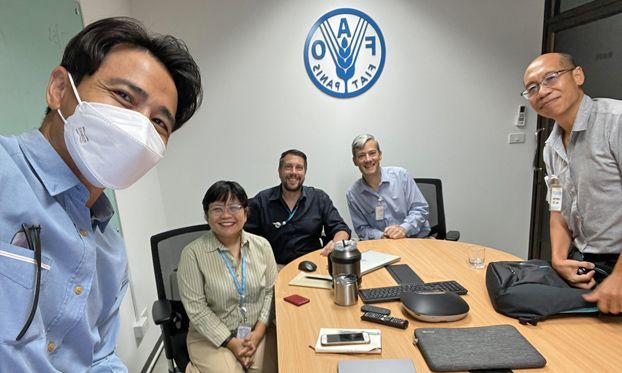 ©fao/Kachen Wongsathapornchai | ASIA AND THE PACIFIC USAID RDMA and ECTAD RAP meeting for work plan implementation ECTAD RAP team met the USAID Regional Development Mission for Asia (RDMA) to discuss planning for the implementation of FY2024 work plan and to strengthen synergies with other new and ongoing initiatives at FAO ECTAD RAP. The overall planned activities for the forthcoming period were presented by ECTAD RAP, and foreseen adjustments on implementation arrangements were also discussed. Additionally, discussions on the next deep dive session on monitoring, evaluation, and learning (MEL) in October 2023, were also covered. The meeting also presented the opportunity to be introduced to Dr Benjamin Isquith, the new Deputy Director, Office of Public Health, USAID RDMA, and also discuss further updates on USAID RDMA and Missions in the region. |
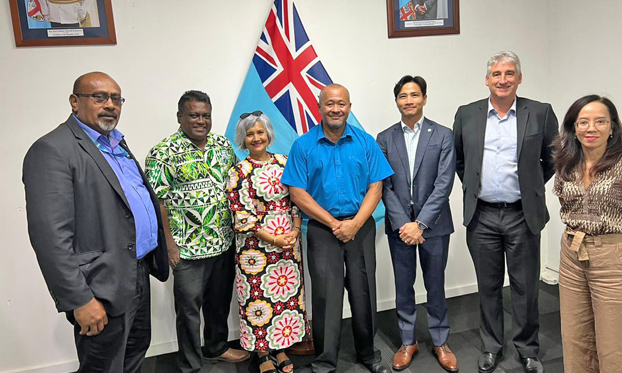 ©fao/Kachen Wongsathapornchai | ASIA AND THE PACIFIC ECTAD is expanding to Fiji and the Pacific Marking the beginning of the expansion of ECTAD’s footprint to the Pacific, with support from USAID, the ECTAD Regional Manager, Kachen Wongsathapornchai, and ECTAD Budget Holder, Andrew Sobey made a short, but productive trip to Samoa and Fiji from 21 to 25 August. They met with senior officials from a number of partner organizations including FAO SAP, WHO, Biosecurity Authority of Fiji, Ministry of Agriculture and Waterway, Ministry of Health, Australian High Commission, and Secretariat of the Pacific Community to explore future collaborations. Kachen and Andrew also took the opportunity to participate in the Pacific One Health and AMR Symposium, the first of its kind to be organized in the region, with Kachen delivering a presentation on FAO and One Health in the Pacific, applying the One Health context broadly to food security, livelihoods, and the economy, in addition to health. On 25 August, Kachen and Andrew also assisted in the facilitation of a national One Health consultation workshop in Fiji to identify potential initiatives to strengthen One Health capacities in Fiji and the Pacific region, with participants from governments and relevant organizations. |
ONE HEALTH
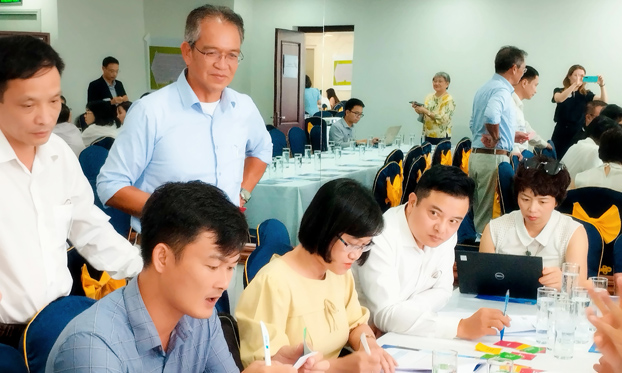 ©FAO/YIN MYO AYE | VIET NAM AND ASIA AND THE PACIFIC National Bridging Workshop organized in Viet Nam As a Tripartite programme, FAO, WHO and WOAH organized the IHR-PVS National Bridging Workshop (NBW) in Hai Phong, Viet Nam on 16-18 August 2023. The United Nations Environment Programme (UNEP) regional office also contributed in the Quadripartite facilitation team, and highlighted the importance of the inclusion of the environment sector in prevention, detection and control of zoonotic diseases. FAO ECTAD in Viet Nam supported the attendance of 45 participants from the Ministry of Agriculture, Forestry and Fisheries and the Ministry of Environment, thanks to USAID. A total of 12 national facilitators were trained. Recommendations from the FAO Surveillance Evaluation Tool (SET) were incorporated into the review process to identify main gaps and strengths, along with IHR and PVS reports, and these were translated into collaborative actions in the development of the NBW roadmap. |
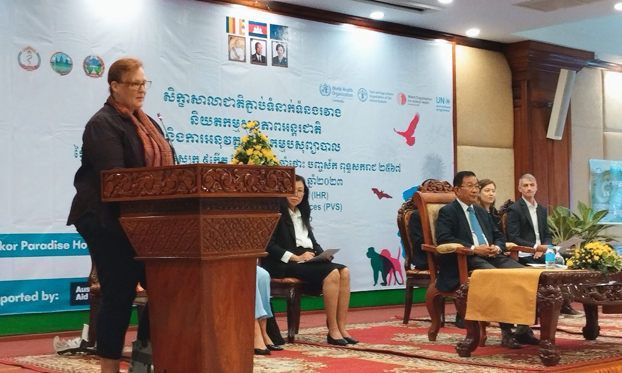 ©FAO/Yin Myo Aye | CAMBODIA AND ASIA AND THE PACIFIC
National Bridging Workshop organized in Cambodia The National Bridging Workshop was co-organized and co-facilitated by FAO, UNEP, WHO and WOAH in Cambodia, on 23-25 August 2023. The FAO Representative in Cambodia highlighted the importance of animal health and FAO’s contribution during the opening ceremony of the workshop. About 110 participants contributed to the workshop, including 47 representatives from the animal health and environment sector supported by FAO, thanks to USAID. Dr. Makara Hak from FAO ECTAD in Cambodia presented on SET, which was conducted on 31 July-10 August 2023, and SET recommendations were reviewed in the workshop to develop a joint NBW roadmap at the animal-human interface. Read more about the event here. |
AFRICAN SWINE FEVER
-outbreak-investigation.jpg?sfvrsn=d963c649_1) ©FAO/Riana Arief | INDONESIA AND ASIA AND THE PACIFIC Regional Simulation Exercise on African swine fever (ASF) outbreak investigation
Two members of the FAO ECTAD Indonesia team, along with representatives from the Indonesian Ministry of Agriculture and other FAO ECTAD country teams from Asia Pacific, participated in the Regional Simulation Exercise on ASF Outbreak Investigation organized by FAO RAP from 15 to 17 August 2023. This event aimed to strengthen capacities of national veterinary authorities to conduct epidemiological investigations of ASF outbreaks. During the event, participants developed recommendations for future changes and improvements to the simulation exercise materials and delivery methods, and presented their policies and experiences with ASF detection, response, and long-term management. All participants were asked to provide feedback and consider how the simulation exercise may be used at the national and sub-national levels in their country. Following the event, representatives from Indonesia will explore the possibility of conducting a simulation exercise on ASF as well as foot and mouth disease (FMD) and lumpy skin disease (LSD) in the country. |
-risk-assessment-workshop-in-north-sulawesi.jpg?sfvrsn=74b367c2_1) ©FAO/Ratmoko Saputro | INDONESIA African swine fever (ASF) risk assessment workshop in North Sulawesi From 13 to 16 August 2023, the Indonesian Ministry of Agriculture (MoA), Indonesian Ministry of Environment and Forestry (MoEF), and FAO ECTAD Indonesia held a workshop to assess the risk of African swine fever (ASF) risk at the domestic pig-wild boar interface in Manado, North Sulawesi province. The assessor team for this assessment included the MoA, MoEF, Disease Investigation (DIC) Maros, and animal quarantine. The participants from the Animal Quarantine of North Sulawesi province, Bogani Nani Wartabone National Park, local government of North Sulawesi province, North Sulawesi Natural Resource Conservation Center, and representatives from animal health services of North Sulawesi districts served as resource persons for data collection. According to the findings of this workshop, the risk of ASF entry and exposure in domestic/village pigs and wild boars in North Sulawesi Province is very high with moderate uncertainty. Moreover, during this session, relevant stakeholders also discussed risk reduction, risk communication, and the timeline for the action plan. Following the workshop, all parties will begin implementing risk mitigation measures for ASF in the North Sulawesi area. |
